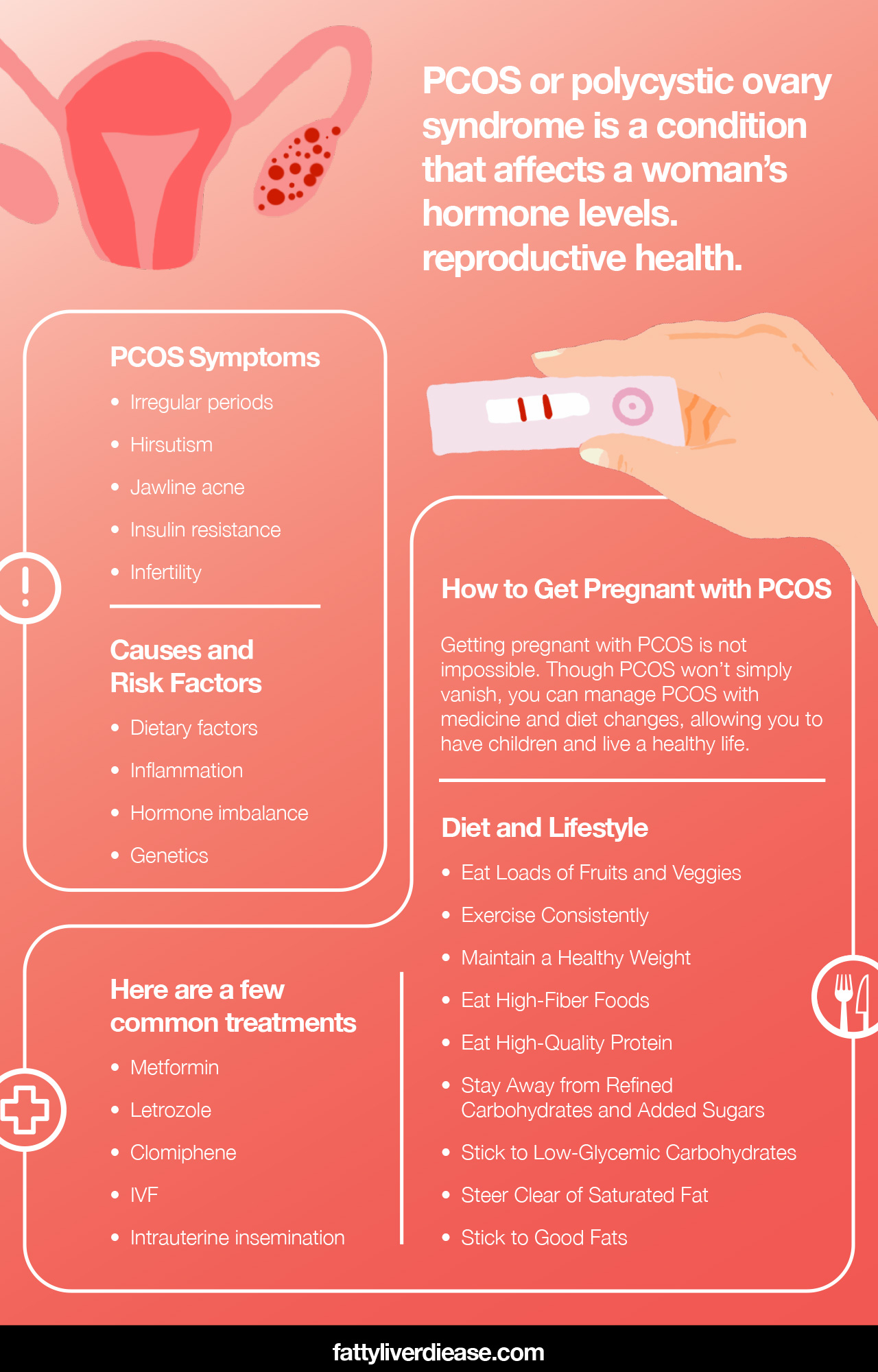Preparing to have a baby and raise a child can be stressful enough. Adding hormonal conditions like PCOS to the mix can contribute to baseline stress and anxiety. Thankfully, however, PCOS and pregnancy are not mutually exclusive. Women who struggle with PCOS can definitely get pregnant! The key is treating and managing PCOS to rebalance hormones. Here we go through tips and strategies that you need to know for how to get pregnant with PCOS.
What Is PCOS?
It might be surprising that PCOS is actually pretty common. The Center for Disease Control estimates that up to 12% of American women live with PCOS? (1)
So, what does PCOS mean exactly? PCOS is a term that stands for polycystic ovary syndrome and is sometimes called polycystic ovarian syndrome. “Polycystic ovary” means that small, fluid-filled pouches are growing on the ovaries. The ovaries are the parts of the female reproductive system that house eggs and release one egg every month in preparation for fertilization.
PCOS is associated with many unpleasant symptoms, including:
- Irregular periods: For many women with PCOS, periods are very irregular and may come with just a few weeks in between. More commonly, women with PCOS may not have a period at all for many months at a time.
- Hirsutism: Hirsutism is the growth of thick hair on the face, chest, neck, and/or back. Hirsutism is often described as a male pattern of hair growth. The hair is usually thick, dark, and very difficult to get rid of.
- Jawline acne: The acne characteristic of PCOS is generally located on the jawline. Acne present on the jawline is indicative of a hormonal imbalance, specifically an excess of male hormones called androgens, more commonly referred to as testosterone.
- Insulin resistance: Insulin resistance is common among many women with PCOS. Insulin resistance means that the hormone insulin is not functioning properly. Normally, insulin is responsible for glucose uptake from the bloodstream into cells. When insulin doesn’t function properly, it is resistant to the presence of glucose, and cells do not receive the signals to utilize glucose from the bloodstream. In turn, this causes blood sugar levels to spike.
- Infertility: When left untreated, PCOS may cause fertility problems, which is a term that describes the inability to get pregnant. For more information about exactly how PCOS interferes with fertility, check out the section below.
Why Does PCOS Interfere with Pregnancy?
To explain the impact of PCOS on pregnancy, we will go through the normal menstrual cycle. Day 1 of the menstrual cycle begins on the first day of your period. During your period, your body naturally produces more follicle-stimulating hormone (FSH). Increased levels of FSH cause tiny pouches located on the ovary called follicles to grow, with each follicle containing an egg.
Around day 10 or 11 of the menstrual cycle, estrogen levels rise, causing levels of luteinizing hormone (LH) to peak. When LH levels are high, a follicle ruptures and releases an egg, which travels down the fallopian tubes and into the uterus. The journey of the egg through the fallopian tube takes about a week or so. When the egg reaches the uterus, it waits for fertilization for up to 24 hours. The walls of the uterus build up with tissue and nutrients in preparation for fertilization. When no fertilization occurs, the body sheds the uterine lining and egg.
In the case of PCOS, the menstrual cycle is thrown off. The growth of ovarian cysts impedes normal ovarian function, and an egg is released either irregularly or not at all. When an egg is released irregularly, this makes it difficult to track ovulation and get pregnant. In order for pregnancy to occur, ovulation is required so that sperm can join with an egg. If the body fails to ovulate, it is impossible to get pregnant.
Causes and Risk Factors
The exact cause of PCOS is unknown, though researchers have identified factors that are associated with a higher risk of developing PCOS.
- Dietary factors: Eating a diet high in sugar and saturated fat is known to interfere with proper insulin function, which may also worsen hormonal imbalances.
- Inflammation: Inflammation is considered to be a significant factor that contributes to hormonal imbalance and insulin resistance. Inflammation is a major culprit in a host of diseases, from type 2 diabetes and fatty liver disease to PCOS.
- Hormone imbalance: Some individuals are prone to producing an excess of androgenic hormones.
- Genetics: It is possible that genetics plays a role in the propensity for developing a hormonal imbalance
Accompanying Conditions and Complications
Women with PCOS tend to be at a higher risk for certain conditions, particularly metabolic disorders.
If you have PCOS, it’s also likely that you have one or more of the following conditions:
- Weight gain or obesity: Obesity and hormone dysfunction are very intimately connected. Obesity or carrying extra weight is prevalent among women with PCOS. This may be due to a combination of diet, lifestyle, genetics, and
- High cholesterol: High cholesterol is a common condition among women with PCOS. High cholesterol is connected to the high consumption of fatty and sugary foods.
- Nonalcoholic fatty liver disease: Nonalcoholic fatty liver disease describes the accumulation of fat cells in the liver that is not due to alcohol consumption.
- Type 2 diabetes: Because insulin resistance is so prevalent among women with PCOS, blood sugar levels are more likely to rise to dangerous levels. The combination of insulin resistance and high blood sugar contributes to diabetes.
- Pregnancy complications: Women with PCOS tend to have an increased risk of experiencing complications during pregnancy. Common complications during pregnancy include preeclampsia and gestational diabetes. Preeclampsia refers to high blood pressure that develops during pregnancy and sometimes jeopardizes the health of organs like the kidneys and liver. Gestational diabetes is the development of diabetes during pregnancy resulting in high blood sugar levels. Women with PCOS also tend to have an increased risk of experiencing a miscarriage.
First Step for Treating PCOS
Thankfully, there are many treatment options for managing PCOS and improving women’s health and chances of conceiving.
Getting pregnant with PCOS is not impossible. However, it’s crucial to first treat and manage PCOS in order to maximize your chances of conceiving. Can PCOS go away? Though PCOS won’t simply vanish, you can manage PCOS with medicine and diet changes, allowing you to have children and live a healthy life.
Many women first suspect an issue after many months of trying to get pregnant. For other women, their other symptoms become so unbearable that they prompt a visit to the doctor. In any case, the first step in managing PCOS is to schedule a trip to your doctor’s office, if you haven’t done so already.
Even if you highly suspect that you have PCOS, it’s a good idea to get confirmation from a physician. Your primary care physician can help connect you with a gynecologist/obstetrician as well as specialists in endocrinology. It is possible that you may have symptoms that mimic PCOS but aren’t actually connected to PCOS. It’s important to rule out any other conditions that may be contributing to your symptoms.
There are a variety of medical treatments that can help you manage PCOS while also promoting fertility. Some treatments may be used simultaneously, while others may be used in succession. Many treatments involve ovulation induction and assisted fertilization. Here are a few common treatments:
- Metformin: Metformin is a powerful medication that is often used to manage type 2 diabetes. Metformin works by improving insulin function, which helps to balance hormones. Healthy insulin function helps to restore blood sugar levels and reduce inflammation. Simply restoring systemic balance may encourage natural ovulation.
- Letrozole: Letrozole, known as Femara, targets the ovaries and encourages them to release an egg and increase the probability of sperm making it to the egg, to result in pregnancy.
- Clomiphene: Clomiphene is available as the brand Clomid and helps induce ovulation by regulating estrogen levels.
- IVF: In vitro fertilization (IVF) may be an appropriate form of fertility treatment for women living with PCOS. The IVF process involves lab techniques that result in the fertilization of an egg that is then implanted in the woman’s uterus. IVF might be particularly helpful when conducted in conjunction with other forms of PCOS treatments, including lifestyle, medications, and diet changes.
- Intrauterine insemination: This form of insemination means that a physician is able to strategically plant your partner’s sperm within the uterus, increasing the likelihood of conception.
Keep in mind that other medications can also be used to help promote hormonal imbalance, like birth control and spironolactone. Birth control that contains both estrogen and a synthetic progestin is useful for regulating the menstrual cycle. Spironolactone decreases androgens in the body and helps with excessive hair growth and jawline acne associated with excess testosterone. However, these medications should only be used when you are not trying to get pregnant.
It’s a good idea to consult your physician to come up with a treatment plan that works best for your specific needs. It’s important to keep in mind that a treatment plan that works for one woman with PCOS may not necessarily work for another.
How to Get Pregnant with PCOS: The Importance of Diet and Lifestyle
If getting pregnant is your goal, combining medical interventions with diet and lifestyle changes may be the most effective way to quickly treat PCOS and promote pregnancy. Diet and lifestyle changes can help rebalance your hormones and help to regulate the menstrual cycle, encourage ovulation, and restore natural fertility.
1. Eat Loads of Fruits and Veggies
Fruits and vegetables are healing foods. Not only are they filled with fiber, but they are packed with tons of anti-inflammatory and antioxidant compounds in the form of vitamins, minerals, carotenoids, and polyphenols.
To make sure you’re getting a variety of fruits and vegetables, aim to eat produce that varies widely in color. The different colors in produce correspond to different micronutrients with therapeutic activity.
For example, purple produce like grapes and eggplant offer an antioxidant called resveratrol. Yellow and orange produce like sweet potato, squash, and carrots offer antioxidants called carotenoids. Both polyphenols and carotenoids play an important role in quelling systemic inflammation and oxidative stress, which play a role in worsening PCOS and the associated hormone imbalance.
What exactly are inflammation and oxidative stress? Inflammation refers to an overactive state of the immune system. Under normal circumstances, the immune system operates as the body’s protector and gets rid of pathogens like viruses and bacteria, as well as cancerous cells.
However, when the immune response is overly reactive, there are higher levels of immune cells throughout the body that exhibit low-grade activity, even if there is no threat to the body’s wellbeing. This overactive state interferes with normal cellular and organ function, such as hormonal regulation and the reproductive system, as is the case with PCOS. In severe cases, prolonged immune system overactivity can lead to autoimmune diseases.
Oxidative stress is a related biological state that refers to the buildup of waste products within cells. Oxidative stress can occur in response to inflammation, unhealthy foods, and exposure to irritating and toxic chemicals and pollutants. When cells try to operate under stressful conditions, they are unable to operate as efficiently and effectively, and waste products called free radicals accumulate within cells, further jeopardizing their function. Oxidative stress often occurs in conjunction with inflammation and contributes to hormonal imbalance as well as other conditions like fatty liver disease.
Eating fruits and vegetables is an excellent way to neutralize free radicals, streamline cellular activity, and soothe the immune system.
Need some ideas of fruits and veggies to incorporate into your diet? Try these:
- Red produce: Strawberries, raspberries, watermelon, cherries
- Green produce: Spinach, kale, broccoli, arugula, brussels sprouts, green bell peppers, jalapenos
- Orange produce: Sweet potatoes, carrots, pumpkin, and orange bell peppers
- Yellow produce: Corn, squash, yellow bell peppers
- Blue produce: Blueberries and blackberries
- Purple produce: Grapes, eggplant, shallots, cabbage, plums, purple potato, black currants, figs
- White produce: Cauliflower, garlic, and onions
2. Exercise Consistently
Exercise is a critical part of rebalancing hormones that have been thrown off-kilter as a result of PCOS. Engaging in consistent physical activity is connected to improved insulin sensitivity, a healthier weight, and less inflammation.
Both aerobic exercise and strength training are important parts of a well-rounded exercise regimen. Aerobic exercise encompasses various cardio activities, like running, jogging, walking, swimming, biking, and dancing. As a good rule of thumb, it’s a good idea to aim to get about 30 minutes of aerobic activity daily.
Strength training, on the other hand, focuses on improving muscle strength. Engaging in strength training means that you are using resistance to challenge and train your muscles. Excellent strength training exercises and techniques include lifting weights and using resistance bands. Bodyweight exercises like pull-ups and push-ups are also very effective for stimulating muscle growth and development.
3. Maintain a Healthy Weight
If you are overweight, striving for weight loss and achieving a healthy weight is a significant part of restoring hormonal balance with PCOS. Carrying around excess weight tends to cause inflammation that meddles with healthy hormone levels. Inflammation also contributes to other conditions like type 2 diabetes and fatty liver disease.
Maintaining a healthy weight can be accomplished by eating a healthy diet and exercising. In particular, it’s important that the calories that you eat do not surpass the calories that you burn. On average, a healthy weight is dependent on consuming approximately 2000 calories per day, though this number may vary depending on your age and activity level. Getting regular exercise can also help your body spend energy and burn any extra calories that you may have consumed.
Keep in mind that though having PCOS does increase the likelihood of obesity, it is still possible to have a normal body weight and struggle with PCOS. Individuals who have a lower BMI and PCOS still struggle with hormonal imbalance and insulin resistance.
4. Eat High-Fiber Foods
Eating an abundance of high-fiber foods is crucial for supporting healthy blood sugar levels, insulin function, and digestive health.
High-fiber foods help to slow down the digestion of carbohydrate-rich foods. Foods that are high in carbohydrates are most effectively digested when paired with fiber. For example, fruits are naturally high in carbohydrates and sugar. However, these carbs and sugars don’t have a detrimental effect on the body because they are paired with fiber. The fiber helps slow the digestion and processing of sugars, which helps slow down the release of sugars into the bloodstream. As a result, the high fiber content of fruit essentially inhibits the fruit sugar from spiking blood glucose levels. This helps to increase insulin sensitivity and restore hormone balance.
Fruits and veggies are high in fiber, but what other foods are high in fiber? To increase the fiber content of your diet, eat foods like whole grains, beans, nuts, and seeds. Here are a few examples of fiber-rich foods to add to your diet:
- Whole grains: Brown rice, quinoa, oats, millet
- Beans: Black beans, kidney beans, cannellini beans, black-eyed peas
- Nuts: Pecans, walnuts, cashews, peanuts
- Seeds: Flaxseeds, chia seeds, pumpkin seeds, and sunflower seeds
5. Eat High-Quality Protein
If you have PCOS, making sure you get enough protein in your diet is important for a couple of reasons. Eating a sufficient amount of protein on a daily basis is critical for managing your appetite and helping you feel satiated. Protein digests slowly and progresses gradually through the stomach and digestive tract. Because protein takes longer to digest, it makes you feel satisfied for longer. As a result, you won’t feel hungry as quickly or as easily following a protein-rich meal.
In addition to its satiating effect, high-quality protein also offers optimal ratios of essential amino acids. Essential amino acids are critical for nearly all biological processes, from enzyme production and muscle synthesis to building hormones and neurotransmitters that help regulate your sleep cycle and mood. On top of that, essential amino acids also play a critical role in regulating metabolism.
Ensuring that you get sufficient levels of essential amino acids on a daily basis may play a role in helping mitigate PCOS. A study published in the Indian Journal of Medical Research found that women with PCOS had significantly lower levels of plasma amino acids in comparison to controls. (2) Though it’s unclear whether getting balanced levels of essential amino acids would directly improve PCOS, it’s still a good idea for overall health to ensure a balanced intake of essential amino acids.
So, what kinds of foods offer essential amino acids in balanced ratios? Animal protein sources, in particular, provide an abundance of essential amino acids in optimal ratios for human health. Excellent sources of animal protein include chicken, turkey, lean ground beef, milk, cheese, yogurt, and fish. Just be careful to choose animal proteins that are low in saturated fats.
6. Stay Away from Refined Carbohydrates and Added Sugars
Refined carbohydrates are known to interfere with hormone levels. So, what exactly are refined carbohydrates? Refined carbs are grains that have been processed to remove the outermost layer of the grains, which is the most nutritious part and is usually referred to as the hull. Refined carbs have been subjected to an industrial process that removes protein, fiber, vitamins, and minerals, all of which are stored in the hull.
Grains that have gone through the refining process are generally lighter in color than the original product. This is why refined carbs are often referred to as “white.” Good examples include white bread, white rice, and white pasta. White flour is another refined carb that is found in treats like cakes and cookies.
Like refined carbs, added sugars also interfere with hormone levels and insulin function. Added sugars can be defined as sugar that has been isolated from its original source and artificially added to food products. The majority of these food products containing added sugars are processed or pre-prepared foods. Refined carbs and added sugars are prevalent in the standard American diet and do not differ in terms of the biological response to consumption.
When we consume sugars are refined carbs, the body immediately breaks down these foods into glucose molecules. These glucose molecules are rapidly absorbed into the bloodstream, where they cause a spike in blood sugar. In response to the glucose that has flooded the bloodstream, the pancreas releases insulin, which signals cells to uptake glucose to use for energy. However, long-term consumption of refined carbs and sugars increases the risk that insulin in the metabolic system will malfunction. Disorders affecting insulin and metabolic functioning increase the risk of PCOS.
Both refined carbs and added sugars negatively impact the body system and increase the risk of weight gain and metabolic conditions like fatty liver disease, type 2 diabetes, and insulin resistance.
7. Stick to Low-Glycemic Carbohydrates
It’s clear that in order to mitigate PCOS, it’s important to avoid refined grains and added sugars. So, what kind of carbs should you eat, if any at all? Keep in mind that following an extremely low carb diet is not a good idea, especially when you are trying to conceive. When supporting your fertility, following a more balanced diet that contains all macronutrients, including protein, carbohydrates, and fat, is the way to go.
When trying to mitigate PCOS and prepare your body for pregnancy, you should focus less on the number of carbohydrates and focus more on the quality. The kind of carbohydrates you consume will play a much bigger role in balancing your hormones and supporting fertility.
In order to assess the quality of carbohydrates, it’s important to take into account the glycemic index. The glycemic index of a certain food essentially measures how quickly sugar enters the bloodstream. Low-glycemic foods will slowly enter the bloodstream, while the sugar from high-glycemic foods will rapidly enter the bloodstream.
Because spiking blood sugar levels negatively impact insulin function and hormones, it’s best to eat more low-glycemic carbohydrates. Low glycemic foods include many of the foods discussed above, including whole grains, fruits, veggies, high-quality proteins, beans, nuts, and seeds.
8. Steer Clear of Saturated Fat
Saturated fat wreaks havoc on metabolic health and hormone balance. Saturated fat is an unhealthy fat that accumulates in the bloodstream and leads to conditions like high cholesterol, atherosclerosis, heart disease, insulin resistance, type 2 diabetes, and weight gain.
Interestingly, sugar is regarded as the primary culprit, and saturated fat doesn’t often get any blame in metabolic conditions like insulin resistance. However, saturated fat directly interferes but insulin function by blocking insulin receptors that are present on cell surfaces. With the impeded function of insulin receptors, the release of insulin in the bloodstream fails to trigger the uptake of glucose into cells. High blood sugar levels increase inflammation and worsen hormonal imbalance.
In order to avoid the detrimental effects of saturated fat, it’s important to stay away from foods that contain high levels of saturated fat. Fatty animal products contain the primary sources of saturated fat. To reduce the amount of saturated fat you eat, stay away from red meat, dark meat chicken, dark meat turkey, chicken skins, whole milk, and cheese.
9. Stick to Good Fats
Just because you should stay away from saturated fat, this doesn’t mean that you should avoid dietary fat altogether. In fact, there are many sources of fat that are extremely healthy and exhibit anti-inflammatory properties. In order to promote fertility and fight against PCOS, swap out saturated fats and choose monounsaturated and polyunsaturated fats instead.
Omega-3 fatty acids exhibit potent anti-inflammatory activity, and getting lots of omega-3 fatty acids on a regular basis is associated with the improvement of numerous diseases, including fatty liver disease and type 2 diabetes. You can find these healthy fats and foods like nuts, seeds, salmon, mackerel, and tuna. Avocado is another rich source of healthy fat. If you’re looking specifically for omega-3 fatty acids, stick the fatty fish as an animal source of omega-3 fatty acids, and stick to flax seeds, chia seeds, walnuts, and pecans as the plant sources of omega-3 fatty acids.
Are There Special Tricks for How to Get Pregnant with PCOS Quickly?
If you’re going through the process of treating PCOS and trying to conceive, you may be wondering: how long does it take to get pregnant if you have PCOS? The time to get pregnant varies.
When you’re trying to have a baby, it’s normal to want to conceive as quickly as possible. With effective medical treatment, diet changes, and lifestyle changes, it is possible to manage PCOS and improve your chances of getting pregnant.
However, it is highly dependent on the woman and specific biochemistry. Some women may respond quickly to treatments, while other women may need more prolonged treatment to achieve pregnancy. Keep in mind that PCOS is very treatable, and once it has been treated, it is definitely possible to get pregnant.
Conclusion
Managing PCOS can be challenging but getting pregnant with PCOS is completely possible and doable with medical interventions and diet changes. Making an appointment with your physician is the first step, to confirm the cause of your fertility issues and to ensure that any treatments and healing steps directly work for your specific condition. Though healing from PCOS and restoring fertility is not an instant, quick fix, taking all steps to heal from PCOS will also promote a higher quality of life.

References:























